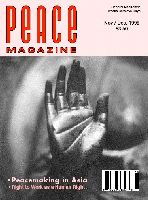
Peace Magazine Nov-Dec 1998, page 13. Some rights reserved.
Search for other articles by Carl G. Jacobsen here
A number of research institutes maintain databases on all known wars, with which to make comparisons and locate the factors correlated with warfare. The scholars who make these comparisons commonly reach this conclusion: Western societies throughout the nineteenth and twentieth centuries have displayed a war culture. They have tried to maintain their own security by attempting to deter emerging threats, but these methods have stimulated conflict rather than avoiding or transcending it.
In recent years, however, there are several trends away from the war culture. A consensus is growing that the approach to conflict resolution that states dictate rarely solves - and in fact often exacerbates - underlying differences. As a further example of challenges to the war culture we must recognize Mikhail Gorbachev's astounding inversion of past arms race truisms. One cannot yet speak of the emergence of a "peace culture," but the core components seem to exist for such an alternative.
However, it is difficult to explain the widespread tendency of Westerners to approach interactions with others from a competitive spirit - even activities that could just as well be played cooperatively. And ministries of defence and foreign affairs are generally run by people who take pride in their "realism" - by which they mean what we would call the "war culture" assumptions: that competition is good (but only if it is won, for it is also a threat); and that interrelationships are zero-sum (which means that any gain for one side means a loss for the other side).
Common Security
Yet an alternative approach had been percolating outward from academic peace researchers, game theorists, Pugwash, and other NGOs. It finally took its first "officially" approved incarnation as the United Nations' Palme Commission (chaired by Olof Palme, then Sweden's prime minister), which promoted the pursuit of "common security." In stark contrast to the zero-sum legacy, common security was a feasible goal that would avoid conflict and enhance mutual confidence. Among the members of the Palme Commission were Russian specialists who gravitated toward the new leader, Gorbachev.
Letting Go the Rope
And with him, "something funny happened on the way to the confrontation." The Gorbachev team walked away from the postwar tug-of-war. Previous years' negotiations, east-west as well as Sino-Soviet, and their zero-sum paranoias, were characterized rather than caricatured by the decades-long, apparently never-ending Mutual and Balanced Force Reduction Talks in Europe, where even suggestions regarding punctuation were assumed to camouflage fiendish aspirations.
Gorbachev cut the zero-sum Gordian knot. He embraced common security. Where previous Soviet leaders had sought to exclude and isolate the United States and China from European and Asian security designs, Gorbachev included them as core and essential partners. Where previous Soviet leaders saw every U.S. or Chinese security demand as necessarily against their interests, Gorbachev sought to meet such demands whenever possible. In the Far East he cut the manpower of many divisions stationed along the Sino-Soviet border, withdrew others, and pulled the remainder from the immediate vicinity of the border. Turning to the West, he announced a unilateral nuclear test moratorium and decreed the unilateral withdrawal of 500,000 troops and significant tanks and other weapons from Eastern Europe. He paid up the overdue Soviet U.N. dues, called for a more cooperative, collective security regime through the U.N. on the global arena, and for a "Common European Home" stretching from the Azores to beyond-the-Urals. In Washington and other NATO capitals the "Evil Empire" suddenly became a prospective partner.
With Gorbachev's political demise, however, more traditional, partisan approaches appeared to reassert themselves. In the Far East, Sino- Soviet normalization and rapprochement survived the change. In the West, however, Washington effectively torpedoed the Organization for Security and Cooperation in Europe as the new European security arbiter. NATO could have been folded into it or retained as a fall-back organization, as the Western European Union had been kept within the European Union. It was not. Instead, it was reaffirmed as its members' ultimate security guarantee, and was even extended to fill the vacuum left in Central and Eastern Europe by the collapse of the Warsaw Pact. It was given new duties as the primary U.N. peacekeeping enforcer in non-CIS Europe and beyond.
A MINIMALIST SOP
In the immediate post-Gorbachev period the Partnership for Peace program that NATO offered to Russia and other post-Soviet states might have served as a half-way house to ultimate membership of a truly pan-European successor. But the years that followed showed instead that the Partnership for Peace was no more than a minimalist sop. NATO's willingness to accept new Central and East European members while rejecting the new post-Soviet states promised a new line dividing the continent. Whether viewed from Moscow, Riga, or other capitals, even the softest possible new dividing line is inherently ominous because it indicates a return to zero-sum fears and mistrust.
But the dramatic, consensual 1990s expansion of U.N. mandated peacekeeping and peacemaking agendas soon burst the bounds of the United States's will. The failures that ensued - the withdrawal from Somalia, the non-interference in the Rwandan genocide, the smoldering embers of post-settlement Bosnia, the unravelling of the U.N.'s Cambodia design, the continuing civil strife in Kosova, Sri Lanka, Afghanistan, Kashmir, Guatemala, Chiapas, and all too many other unhappy locations and constellations, came to mock all declarations of states' morality. The evident shortcomings of state-based conflict resolution designs led to startlingly new interest in alternative theory and approach. As the United Nations commissioned peace research manuals with which to train peace workers in conflict transcendence approaches, the accumulating legacy of peace researchers and Gorbachev are acquiring new life and purpose.
Professor Jacobsen is a political scientist at Carleton University.

Peace Magazine Nov-Dec 1998, page 13. Some rights reserved.
Search for other articles by Carl G. Jacobsen here